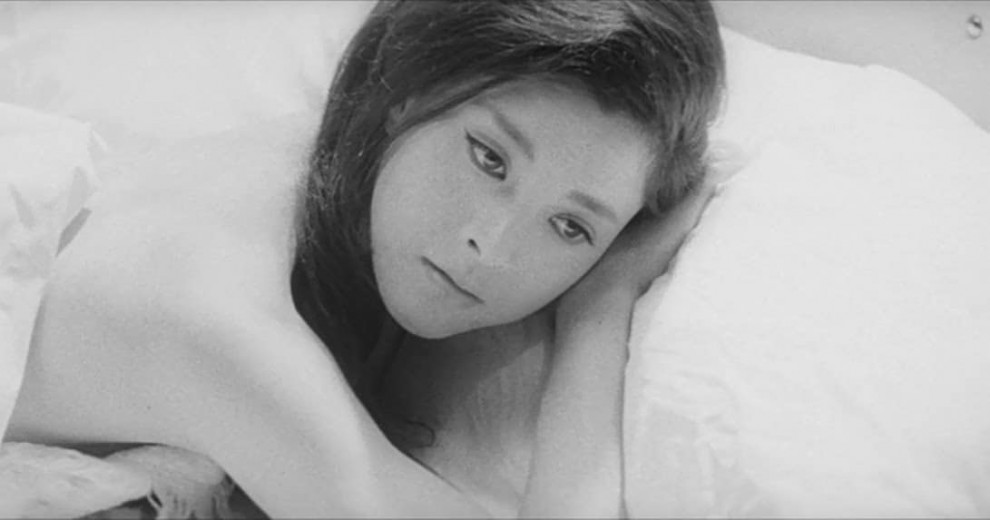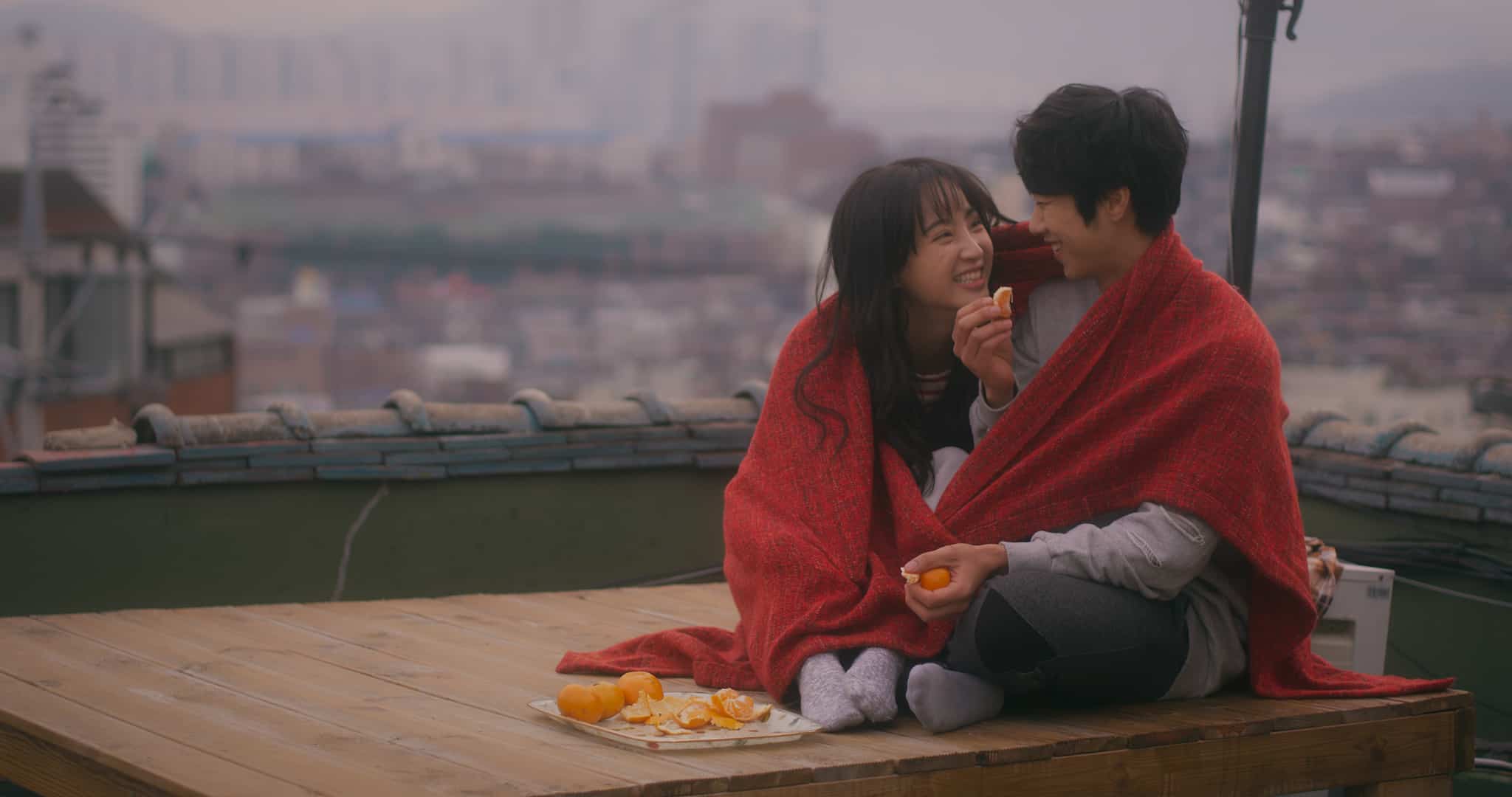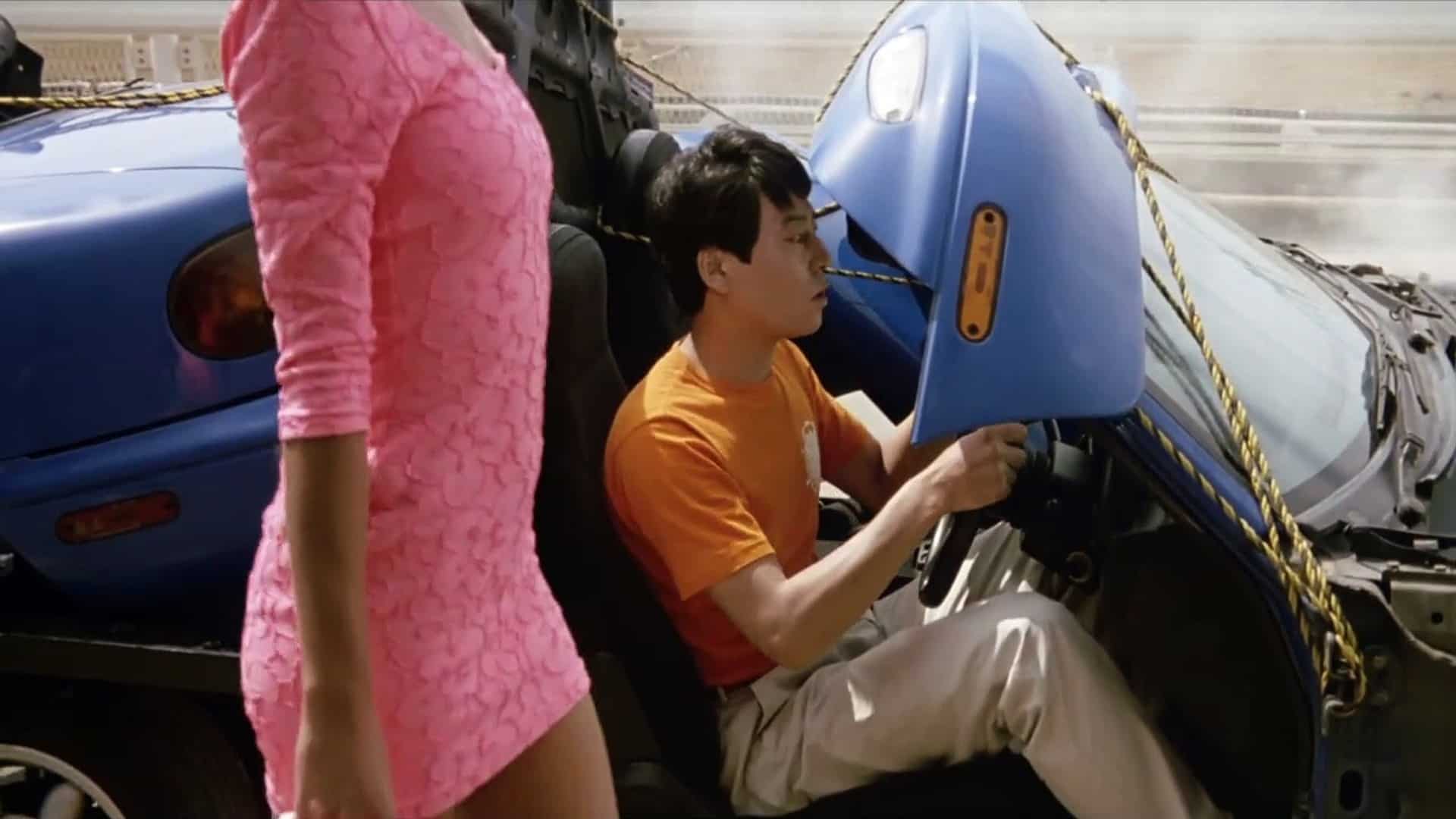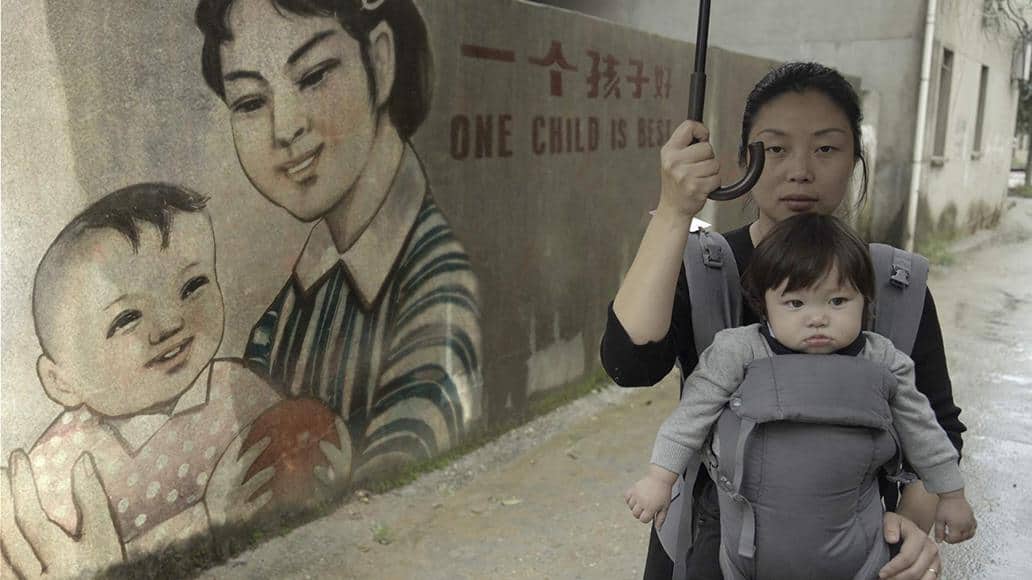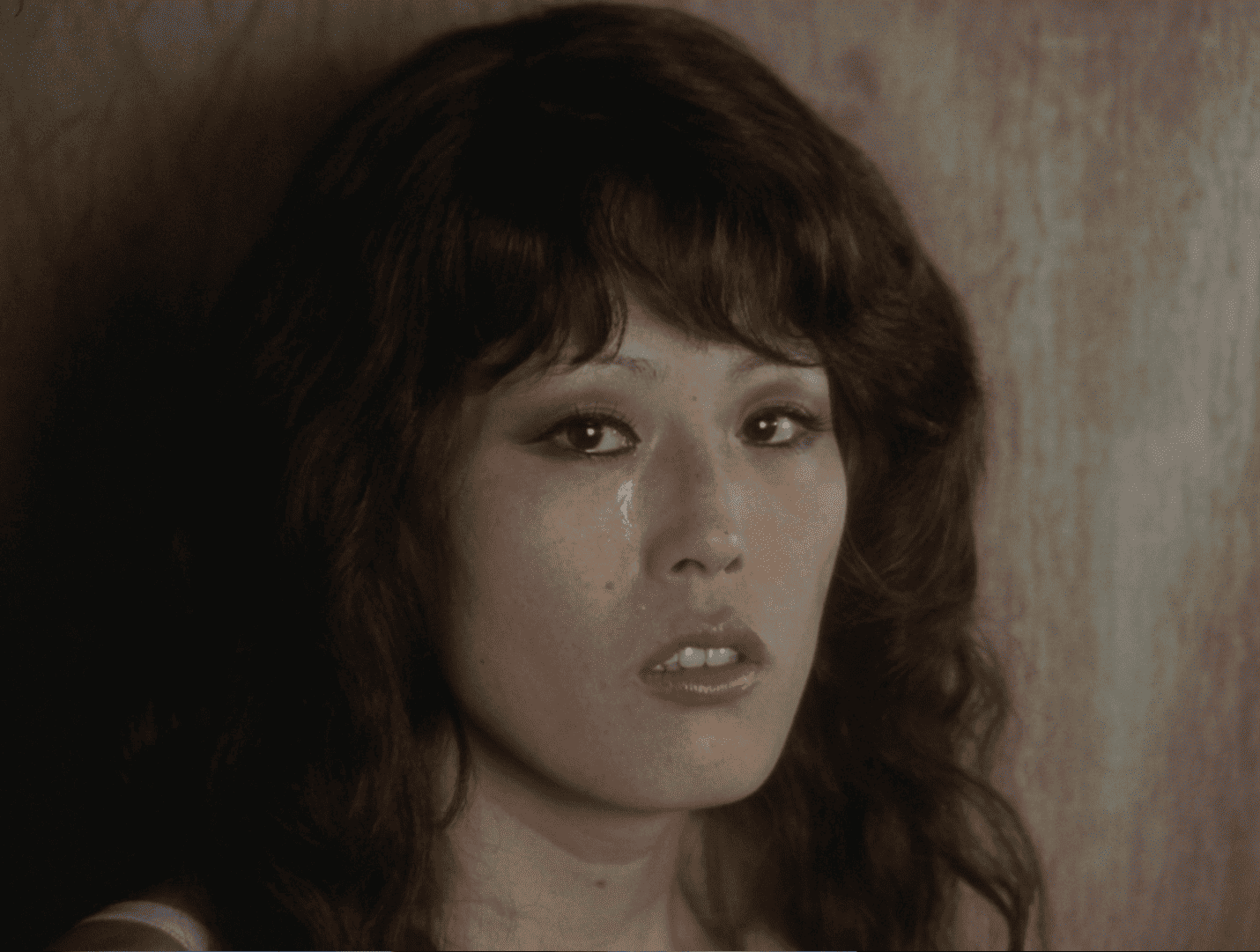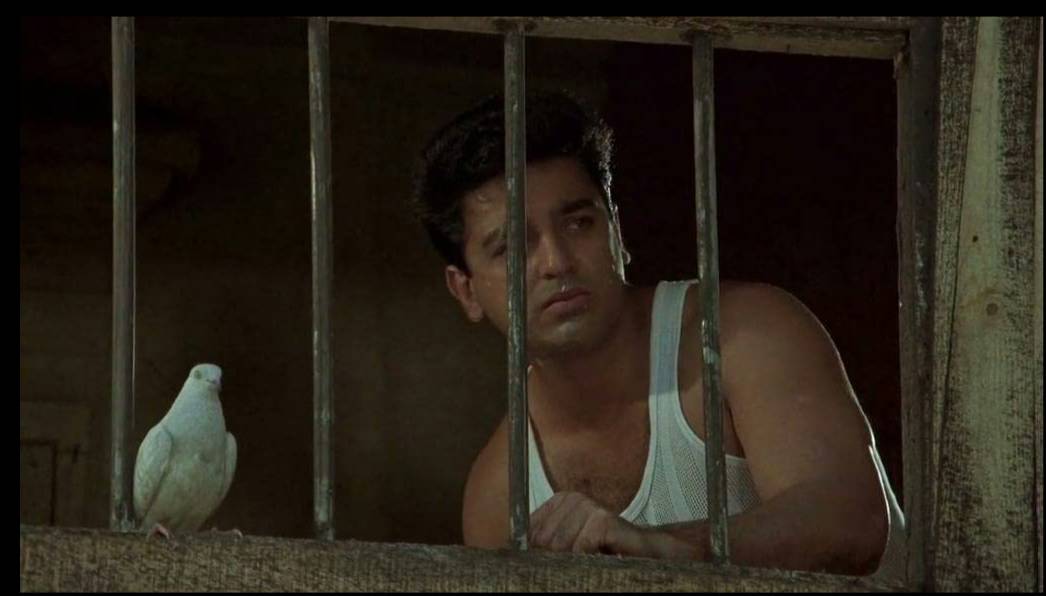By Omar Rasya Joenoes
The first shot of the film is that of a delicate hand stretched against a grey backdrop. It is then joined by another, slightly larger hand, which feels and leaves it. The hand then lowers itself and lands on the shoulder of a man to reveal that we are watching a lovemaking session between a beautiful woman and a younger man. In contrast, the final shot of the film shows the same woman's face at the end of a train car as the vehicle enters a tunnel, swallowing her image whole until there is nothing left to see but the dark. Between the hotel room and the train ride, we are made to witness adultery, blackmail, nude modeling, film shooting, and possibly even murder attempt.
The woman, whose story is the focal point of this photoplay, is called Mizuki Miyako (portrayed by the gorgeous Mariko Okada). A housewife with nothing but comfort to enjoy, her family consists of her much older husband, the commercial director of big department stores in Tokyo, and her young son. She gets in trouble when she poses nude for her lover, who is also her own interior designer, and the pictures end up in the hands of her determined stalker, Ginpei, a schoolteacher who seems to have been eyeing her for quite some time. When Ginpei demands to meet her in person, she is left with either granting his request or have the pictures sent to her husband. The narrative, adapted from Yasunori Kawabata's novel “The Lake”, expands from that point to a sandy place I shall not mention in this review.
The story of love affairs is a story as old as time. It is one of the most common tales in art, much less in films. Love affairs had given cinema some of the best films ever made: “Brief Encounter”, “The Apartment”, “A Heart in Winter”, and “In the Mood for Love” are some films which could attest to this claim. But “Woman of the Lake” is not necessarily a story of a love affair. While the affair serves to drive the plot of the film, the film is very much a mood piece. Had Michelangelo Antonioni directed a film-noir melodrama with Hitchcockian sensibilities, the final product would have resembled “Woman of the Lake”.
It is not for nothing that Antonioni and Hitchcock were mentioned in this review. Yoshida framed the film where the actors and actresses are put against the background to express their emotional drought, with the camera placed as if we were peeping at them. Were we made to feel complicit in the act by the directors? Who knows, but one thing is for certain, the film couldn't have been told any other way. And we shouldn't want it told any other way, anyway.
The luscious black and white cinematography, courtesy of Tatsuo Suzuki (who went on to shoot Toshio Matsumoto's two masterpieces, “The Funeral Parade” of “Roses and Demons”), elevated and expressed the elegant staging Yoshida was trying to establish to unreal heights. Virtually every shot of the film whispered loneliness and longing. They tell everything and nothing. They are mysterious and inviting all at the same time. They are simultaneously beautiful and forlorn.
The film is Antonioniesque not only in style but also in spirit, evoking the alienation of modern life the great Italian director explored four times with his muse, Monica Vitti. These are not smart-talking gumshoes and murderous femme fatales looking for financial and emotional gain we get to watch, they are your every day housewife, schoolteacher and interior designer, doing things for reasons unknown to us and maybe even themselves, just as long as it gives them a brief purpose to escape from their mundane routines. What they do not realize, or at least refuse to realize, is that what they do wouldn't let them evade the emptiness they are feeling. They can try to run, but they cannot hide, until they are finally trapped in the landscape they occupy.
Speaking from a personal viewpoint, black and white is the only way to display this film. In almost every shot, the characters were bathed in light and shadows, as if to remind us time and time again the nature of these characters, who look as if their bodies were trapped, or even belittled, by their surroundings and their souls, by the ever-changing nature of human motivation. The cinematography is lush and will carve its images to your mind long after the closing shot. It is the kind of film which could urge you to wonder why color is such a praised element in modern films.
The film, just like any Yoshida film, is sensual and erotic, but never banal and gratuitous. And just like any Yoshida film, it is ripe for rediscovery both in the East & the West and should be prime fodder for Criterion treatment by the esteemed Criterion Collection. Yoshida is mostly known for directing “Eros + Massacre”, and as great as that film is, Woman of the Lake proves that the rest of his filmography are worthy of our attention.
Speaking of rediscovery, Mariko Okada should probably be more famous too. The performances on this film is good overall, but hers is superb. Much like Monica Vitti, Edith Scob, Emmanuelle Beart, and Elena Anaya, she is the kind of actress who could tell her whole life story with a simple glance to her not-so-secret admirer or a walk from her hotel to a bus station. Just like the actresses I mentioned, Okada is alluring, and the film wouldn't have worked if she were not alluring. But her allure extends also to her acting. Her performance is whole and complete. Not once in the film did she ever give a notion that this is another pretty face picked from the streets by some talent scout on Sidney Falco mode. This is a capable actress and a worthwhile muse bringing the concept her director, who is also her husband, had in mind to the screen. She is never aware of the camera, but always aware to do her character justice. It is the kind of acting which rarely garners any award for and because of its subtlety and depth, but rewards our attention with feelings and knowledge my words could not do justice, should we be willing to read between the lines.
In conclusion, if you wish to be submerged to attractive visuals and loose narrative by one of the most underrated living filmmakers, Woman of the Lake is your destination. Just be sure to heed the advice a sleazy photo studio owner gave to Miyako when she asked to purchase her own nude pictures from his hands, “It's expensive, love affairs. Not, madam?”
Well, since Miyako ends up buried in the darkness on her road to nowhere, I would say yes. Oh, yes, it's very expensive.


